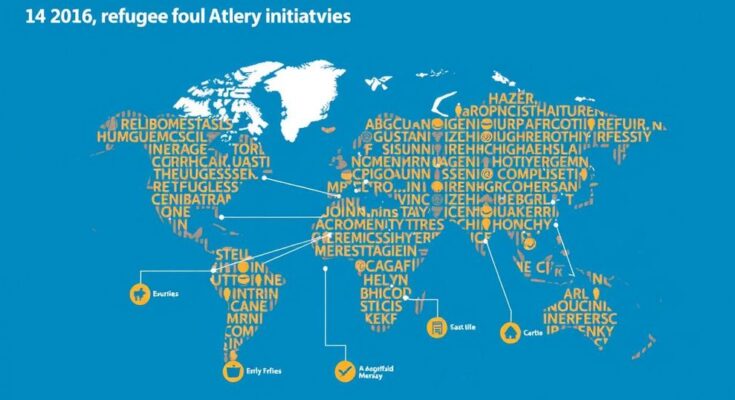The collaboration involving Spotify, Coldplay, FC Barcelona, the FC Barcelona Foundation, and UNHCR aims to address the severe impacts of the climate crisis on refugees and their host communities in Uganda by promoting reforestation and innovative waste management strategies. Uganda’s vulnerabilities to climate change greatly affect over 1.7 million refugees, highlighting the need for immediate and sustainable action. Through this initiative, stakeholders are not only assisting displaced individuals but are also empowering local communities against environmental challenges.
The climate crisis significantly impacts those who are refugees and those displaced due to conflict, as well as the hosting communities that often find themselves in dire situations with limited options for relocation. In response to these challenges, a joint initiative launched by Spotify, Coldplay, FC Barcelona, the FC Barcelona Foundation, and UNHCR aims to aid reforestation efforts in Ugandan refugee settlements and surrounding host communities. This initiative not only seeks to rectify ecological damage caused by extreme drought but also provides support for young refugees who are innovatively tackling plastic waste issues by converting discarded plastics into sustainable building materials Since the year 2022, FC Barcelona and UNHCR have recognized the transformative potential of sports and have collaborated to create protective sporting activities for individuals who have been forcibly displaced, with specific outreach to refugee children and youth in various countries including Colombia, Malaysia, Türkiye, El Salvador, and Uganda. Uganda, in particular, experiences critical vulnerabilities due to climate change, characterized by unpredictable rainfall, recurrent droughts, floods, and seasonal forest fires. These climate-induced challenges disrupt agricultural cycles, exacerbating food insecurity across the region. Furthermore, Uganda shelters over 1.7 million refugees from nations such as South Sudan, the Democratic Republic of Congo, Burundi, and Somalia. Those who have fled conflict confront heightened risks stemming from climate change effects. The interplay of climate change and forced migration exacerbates resource scarcity, escalates societal tensions, and complicates the delivery of necessary protection and support services to both the refugee population and their host communities. UNHCR actively facilitates and advocates for climate-focused initiatives aimed at refugees through collaborations with partners and the private sector, directed toward immediate refugee needs while fostering long-term, sustainable community strategies that bolster essential services and lessen the reliance on humanitarian assistance. This holistic approach aims to empower communities against ongoing climate adversities and prepare them for future challenges.
The intersection of climate change and forced migration poses exacerbated risks to vulnerable populations globally, particularly among refugees and internally displaced persons. The urgency of addressing these issues is underscored by escalating environmental crises, which disproportionately affect marginalized groups, including refugees and their host communities. In Uganda, a significant refugee-hosting country, the challenges of climate change manifest through extreme weather patterns that hinder agricultural viability and heighten food insecurity, complicating the lives of millions. Recognizing these issues, various organizations have begun to address the dual crises of environmental degradation and humanitarian need through innovative partnerships aimed at fostering resilience and sustainable development in affected regions.
In conclusion, the partnership between Spotify, Coldplay, FC Barcelona, the FC Barcelona Foundation, and UNHCR marks a vital step toward addressing both the climate crisis and the plight of refugees in Uganda. By focusing on reforestation, sustainable practices, and sport for protection, this initiative offers a multi-faceted approach to mitigate the impacts of climate change while uplifting the lives of those who have been displaced. Sustainable solutions, such as transforming plastic waste into useful materials, demonstrate creative problem-solving in the face of adversity. Ultimately, the collective commitment to climate action for refugees aims not only to provide immediate relief but also to foster resilience and sustain essential services for communities facing multidimensional challenges.
Original Source: www.unhcr.org




